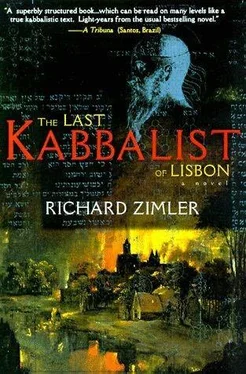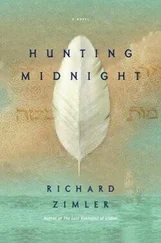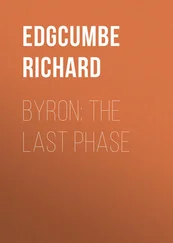Richard Zimler - The Last Kabbalist of Lisbon
Здесь есть возможность читать онлайн «Richard Zimler - The Last Kabbalist of Lisbon» весь текст электронной книги совершенно бесплатно (целиком полную версию без сокращений). В некоторых случаях можно слушать аудио, скачать через торрент в формате fb2 и присутствует краткое содержание. Год выпуска: 1998, Издательство: Arcadia Books, Жанр: roman, Исторический детектив, Философия, на английском языке. Описание произведения, (предисловие) а так же отзывы посетителей доступны на портале библиотеки ЛибКат.
- Название:The Last Kabbalist of Lisbon
- Автор:
- Издательство:Arcadia Books
- Жанр:
- Год:1998
- ISBN:нет данных
- Рейтинг книги:5 / 5. Голосов: 1
-
Избранное:Добавить в избранное
- Отзывы:
-
Ваша оценка:
- 100
- 1
- 2
- 3
- 4
- 5
The Last Kabbalist of Lisbon: краткое содержание, описание и аннотация
Предлагаем к чтению аннотацию, описание, краткое содержание или предисловие (зависит от того, что написал сам автор книги «The Last Kabbalist of Lisbon»). Если вы не нашли необходимую информацию о книге — напишите в комментариях, мы постараемся отыскать её.
The Last Kabbalist of Lisbon — читать онлайн бесплатно полную книгу (весь текст) целиком
Ниже представлен текст книги, разбитый по страницам. Система сохранения места последней прочитанной страницы, позволяет с удобством читать онлайн бесплатно книгу «The Last Kabbalist of Lisbon», без необходимости каждый раз заново искать на чём Вы остановились. Поставьте закладку, и сможете в любой момент перейти на страницу, на которой закончили чтение.
Интервал:
Закладка:
Which leads me to the reason I have taken up my reed pen once again and told you our story.
As I said at the beginning of our tale, I had a visitor just yesterday, around midday: Lourenço Paiva, the son of our old laundress and friend, Brites. Before his mother’s death, she had asked him to come and offer me back ownership of our old house at the corner of the Rua de São Pedro and Rua da Sinagoga, to see if I wanted to return home.
With our old house keys biting into my closed fist, I turned away into a vision of Portugal: Cork trees and poppies. Roseta and her collar of cherries. Mordecai and my father. Lisbon’s houses of white and blue. Rossio Square. The mirror of river beyond our old synagogue. The sweet scent of the oleander bushes in our courtyard. Judah and Uncle. The graves on the Almond Farm.
Then, a vision opened inside me, one in which my master tossed me Portuguese letters knotted into a chain which read: as nossas andorinhas ainda estão nas mãos do faraó —our swallows are still abandoned to Pharaoh. As my gaze passed over these words of New Christian code a second time, they lifted into the air, then broke with a tinkling sound.
When I came to, my chest was pounding a verse that said: I have a chance to go home.
And that’s when isolated events in my Torah memory suddenly linked together into a reading of the past which I believe my uncle had counted on me to make so many years ago.
I reached for my wine carafe and grabbed the vellum ribbon on which Aunt Esther had written my name and Uncle’s—the ribbon which he gave me just before his death, when he promised to come to my aid no matter what the circumstances. Alone in my prayer room, I remembered the terrible verses from Genesis about the sacrifice of Isaac which my master made me recite to Judah that fateful Passover… He had explained to us that in order to achieve the highest of goals, the self had to be extinguished. He had meant his self.
Before his death, in our cellar, Uncle had posed questions to me about my willingness to leave Portugal. He spoke of his grave fears that my mother and Reza would never be willing to depart. These fears betray his motivation; he was implying that only the most terrible tragedy could sever my mother and Reza—his only living child—from Portugal.
Even the words of my uncle’s which were quoted by Diego in the bogus suicide note he wrote for Solomon the mohel make reference to an occult reason for his death: “Your iron blade will anneal me to God and maybe even serve a higher purpose.”
What higher purpose could his death have served? What was my master thinking?
Over the last twenty-four hours, I have let my speculations mingle with my questions till they formed a knotted pattern which refused to release me. So I took down my ink well from its shelf and got out the manuscript which I had originally written in the Christian year of fifteen and seven and which—with a few minor alterations—has now become what I refer to as Book One. And that’s when I began to complete our story for you.
Mesirat nefesh, the willingness to risk everything for a goal that will effect reparations in the Lower and Upper Realms. Only now do I believe that I understand how such unspoken courage lit Uncle’s emerald eyes, moved his hands to bless the world.
“I swear to protect you from the dangers which dance along the way,” he had pledged to me when I was but eight. Yes, he had lived up to his words. For here I was, safe, in Constantinople!
What I am trying to say, fitfully, hesitantly, because of my own failing strength and the effect of too much Anatolian wine, is that Uncle sacrificed himself. In part, probably, to try to save the girl, Teresa, who was murdered alongside him. But more importantly, I believe that he let himself be killed for the generations to come. To force my mother and Reza—our entire family—to leave Portugal. To enable our family tree to take root securely in another land. A land with soil willing to accept Jews without masks.
Not that I’m theorizing that my uncle willed Diego down into his cellar or brought him there through practical kabbalah. No. But perhaps Uncle suspected that he’d receive a visit. Whatever the case, there came a moment—maybe only when Diego descended the cellar stairs—when my master began to understand the true meaning of the riot against us, when he saw the possibilities which would spring from his death at the hands of a murderer. For better or for worse, he concluded that our family, our people, had reached a terrible impasse, and that only his violent death would compel us to break through.
Is this theory insanity? Maybe so. Maybe only God knew that my uncle was going to be sacrificed that Passover.
And yet there is more evidence to support my theory, a bit of proof which may convince you that what I say is at least possible.
Years ago, Farid claimed that the drawing of Mordecai in Uncle’s last Haggadah was modeled on my face, that I was cast as the savior of the Jews from the Book of Esther. I didn’t think it possible; Mordecai appeared far too old in the drawing.
I reasoned, too, that even if Uncle had modeled this hero’s face upon my own, it was because he had had a mystical inkling that I would later take revenge on his Haman—Diego.
In examining this illuminated panel yesterday, however, I discovered something astounding. Mordecai looks very much as I do now, twenty-four years after Uncle drew him. We share the same closely cropped graying hair, the same weary eyes—both of us survivors, but witnesses to tragedy as well.
You see, Uncle had so discerning an eye that he was able to paint what I would look like nearly a quarter of a century into the future.
So only now do I begin to accept that my master had gifted me with a greater purpose, had divined that I, like this ancient Jewish hero, would one day fight to save our people.
And I am convinced that this is the reason why—in the vision I had yesterday—my uncle called me “Mordecai.” He wasn’t using my older brother’s name, as I originally thought, but that of the Biblical saviour of our people.
Yet how had he intended for me to rescue them—I, Berekiah Zarco, a man who no longer even believes in a personal God?
Your hands are touching the answer; I suspect that Uncle sensed that only the nightmare of his death would compel me to write this very book which you are now reading. That only his violent departure from the Lower Realms would make me see that our future in Europe was finished. That only the most terrible tragedy could convince me to beg all the Jews—every last one of us, whether New Christian or not—to move to where we will be safe from the Inquisition and whatever other horrors the Christian kings will one day dream up for us.
For if there is one thing we can say about the European monarchs it is that they have no shortage of dreams about the Jews. We haunt them in their spiritual darkness.
If you don’t admit that there is even a small chance that these speculations are a valid reading of his actions, then I wish you well in your loneliness; it is clear you have never known anyone with my uncle’s spiritual strength, with causeless, unconditional love for you, who would sacrifice himself for your survival.
Or perhaps it would be more appropriate for me to pity my own talents as a writer; my tale has not succeeded in convincing you that Master Abraham Zarco was real. I apologize. But now I tell you, and you must find the courage to believe: there exist men and women with such passionate resolve that they will willingly give up their lives for generations of children whom they will never even meet.
So I was wrong all those years ago when I told my old friend Rana Tijolo that Uncle still believed Jews could speak in the future tense in Portugal. He knew then that there was only the past for us in Iberia and in all the Christian lands of Europe. Can you believe it was mere whimsy that made him plan for us to move to a Moslem land, to Turkey?
Читать дальшеИнтервал:
Закладка:
Похожие книги на «The Last Kabbalist of Lisbon»
Представляем Вашему вниманию похожие книги на «The Last Kabbalist of Lisbon» списком для выбора. Мы отобрали схожую по названию и смыслу литературу в надежде предоставить читателям больше вариантов отыскать новые, интересные, ещё непрочитанные произведения.
Обсуждение, отзывы о книге «The Last Kabbalist of Lisbon» и просто собственные мнения читателей. Оставьте ваши комментарии, напишите, что Вы думаете о произведении, его смысле или главных героях. Укажите что конкретно понравилось, а что нет, и почему Вы так считаете.












